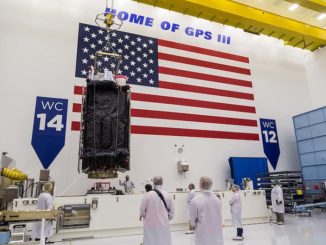
With Tropical Depression Eta forecast to restrengthen into a tropical storm and move toward Florida, United Launch Alliance moved an Atlas 5 rocket off its launch pad at Cape Canaveral Friday and delayed liftoff with a U.S. government spy satellite to Wednesday.
Riding a mobile launch platform, the 206-foot-tall (63-meter) Atlas 5 rocket began rolling back into its hangar along rail tracks shortly after 4 p.m. EST (2100 GMT) Friday. A short time later, locomotives maneuvered the rocket into ULA’s Vertical Integration Facility about a third of a mile south of the launch pad.
ULA said it moved the rocket back into the vertical assembly building “due to impending weather from Tropical Depression Eta.” Teams planned to secure the rocket and its payload inside the VIF as forecasters predict a chance of storms and gusty winds across Central Florida later this weekend and into next week.
The next launch opportunity for the Atlas 5 rocket will be Wednesday, Nov. 11, at 5:22 p.m. EST (2222 GMT), ULA said in a brief statement Friday.
A classified payload for the National Reconnaissance Office — owner of the U.S. government’s fleet of spy satellites — is mounted on top of the Atlas 5 rocket. The launch is designated NROL-101 in the NRO’s mission manifest, but officials have not disclosed any information about the payload.
Friday’s rollback was the second time the Atlas 5 rocket for the NROL-101 mission has returned to the Vertical Integration Facility. ULA ground crews first rolled the rocket to the launch pad Monday, Nov. 2, for a launch attempt Tuesday.
But mission managers returned the rocket to the VIF to replace an environmental control system duct feeding conditioned air to the NRO payload.
After moving the rocket back to the launch pad Tuesday, ULA aimed to launch the mission Wednesday. But a problem with liquid oxygen valves at the launch pad forced officials to scrub the launch attempt Wednesday.
ULA rescheduled the mission for Friday, but the company said yesterday the next opportunity to launch the Atlas 5 rocket would be pushed back to Sunday. With the threat of bad weather from Tropical Depression Eta, ULA decided again Friday to delay the launch until Wednesday, Nov. 11.
The company said in a statement that the issue with remotely commanded ground system liquid oxygen valves — which thwarted the launch attempt Wednesday — was resolved.
“The rocket and payload are healthy,” ULA said.
As of 4 p.m. EST Friday, the center of Tropical Depression Eta was located over the western Caribbean Sea, according to the National Hurricane Center. The storm made landfall as a major hurricane Tuesday in Nicaragua, then weakened before re-emerging in the Caribbean Sea earlier this week.
Forecasters predict Tropical Depression Eta will strengthen into a tropical storm later Friday or Saturday as it moves northeast toward Cuba, then turns west or northwest over the Florida Straits or over South Florida.
If the forecast holds, rain showers and gusty winds from the outer bands of Eta could impact Florida’s Space Coast in the next few days.
ULA’s decision to roll the Atlas 5 rocket back into its protective hangar at Cape Canaveral came as SpaceX gears up to move a Falcon 9 rocket and Crew Dragon capsule to pad 39A at the nearby Kennedy Space Center this weekend. SpaceX is readying the Falcon 9 and Crew Dragon for a test-firing Monday, in preparation for launch with four space station astronauts Nov. 14.
It was not immediately clear if the threat of bad weather from Tropical Depression Eta might impact SpaceX’s plans.
Email the author.
Follow Stephen Clark on Twitter: @StephenClark1.



